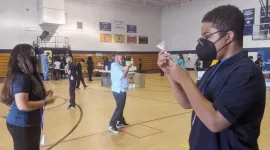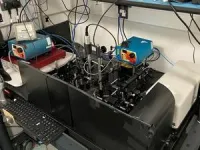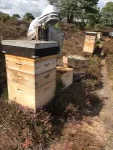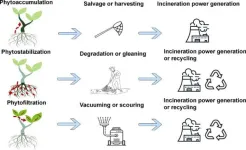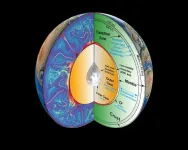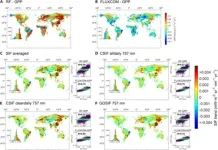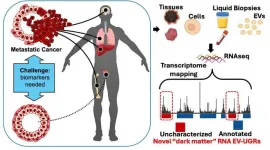(Press-News.org) In response to the COVID-19 pandemic, a majority of schools across the U.S. shifted to virtual learning. In a new study, published in Social Education Research, researchers conducted interviews with parents of students who attended middle or high schools to understand how virtual learning impacted their daily routines, stress levels, and the academic performance of the children.
The transition to virtual learning necessitated the creation of online lessons in a very short time period and with limited training of teachers. As a result, parents and students had to deal with unexpected changes in their home lives and learning environments.
“Virtual learning will not be limited to the pandemic, and we need to prepare for the future. We can see it becoming more popular, for example as a replacement for snow days. Therefore, we need to know how parents feel, so we can adjust how we approach virtual learning,” said W. Catherine Cheung, an assistant professor of physical therapy at Northern Illinois University.
The researchers recruited 20 parents initially as part of a larger research study aimed at examining the feasibility of using saliva-based testing in five K-12 schools in Illinois. The participants filled out questionnaires and participated in semi-structured interviews in the summer of 2021. The researchers then used constant comparative analysis and emergent coding to find patterns in the participants’ answers.
When the parents reflected on the impact of virtual learning, some agreed that its impact on their work schedule was a major source of stress. Additionally, they found it taxing to monitor their children to ensure that they completed their work. “It stopped me from doing a lot of things because I had to make sure that they were doing what they were supposed to. It was like I went back to school,” one parent stated. Virtual learning also caused financial stress, since the families had to buy more groceries and spend more on reliable internet.
The parents were also asked how their children responded to virtual learning, and many felt that the lack of social interaction had a negative effect on their children’s mental health. One parent shared, “I think that isolation had a significant impact on our kids. There’s very little time for socialization anyway and with having older kids, we don’t have the connections with [other] parents.”
Several parents also felt that in-person schooling was better for their children’s academic needs. One parent stated, “I saw that they were falling behind, their learning went down, and their concentration wasn’t there. It was very, very hard.” They were also concerned that their children’s academic performance would be affected once they returned to in-person schooling.
Notably, a few parents, whose children received special education services, reported having positive experiences with virtual learning. These parents were able to assist with their children’s needs better, with one parent reporting, “Remote learning was a great thing for [my child] because he has a neurological disability and has an issue with writing. It allowed him to be more successful at writing because of the format.”
“When we started the study, there were no data available on how the parents were dealing with the situation, outside of anecdotes,” said Rebecca Smith (CGD/IGOH), an associate professor of epidemiology at the University of Illinois Urbana-Champaign. “Now schools can consider different aspects of education, including the home situations of students. They need to think about what the students on the margins are going to need, rather than trust that they'll get taken care of.”
The study “Exploring Parent Perceptions of Virtual Learning in School: Learning During a Pandemic” can be found at https://doi.org/10.37256/ser.5220244572. The work was done in collaboration with Michaelene Ostrosky, Grayce Wicall Gauthier Professor of Education at Illinois.
END
Researchers investigate parent perceptions of virtual learning
2024-08-16
ELSE PRESS RELEASES FROM THIS DATE:
Ancient DNA reveals Indigenous dog lineages found at Jamestown, Virginia
2024-08-16
Previous scientific studies have indicated that North American dog lineages were replaced with European ones between 1492 and the present day. To better understand the timing of this replacement, researchers from the University of Illinois Urbana-Champaign and the University of Iowa sequenced mitochondrial DNA from archaeological dogs. Their findings suggest a complex social history of dogs during the early colonial period.
Europeans and Native Americans valued their dogs as companion animals, using them for similar work and as symbols of identity. Consequently, ...
Researchers make breakthrough in fight against COVID-19
2024-08-16
A team led by Jose Onuchic at Rice University and Paul Whitford at Northeastern University, both researchers at the National Science Foundation Physics Frontiers Center at the Center for Theoretical Biological Physics (CTBP) at Rice, has made a discovery in the fight against severe acute respiratory syndrome coronavirus-2 (SARS-CoV-2), the virus responsible for COVID-19.
The team, in partnership with an experimental effort led by Yale University researchers Walter Mothes and Wenwei Li, has uncovered new insights into how the virus infects human cells and how it can be neutralized. Their findings were published in the ...
Methamphetamine-involved psychiatric hospitalizations have increased, study says
2024-08-16
AURORA, Colo. (August 16, 2024) – A new study, out now in Drug and Alcohol Dependence, that details trends among psychiatric hospitalizations between 2015-2019 finds that while most hospitalizations did not involve any substances, methamphetamine-related hospitalizations have increased while overall number of psychiatric hospitalizations remained stable.
Additionally, researchers detail that psychiatric hospitalizations caused by methamphetamine use were highest in the Mountain West region but were also shifting geographically. “Rates of ...
Green warriors: plants on the frontline against microplastics
2024-08-16
In an innovative ecological article, researchers have unveiled the potential of phytoremediation to curb microplastic pollution. This approach leverages natural plant processes to absorb and diminish micro and nanoplastics, offering a viable solution for managing environmental plastic pollution. This viewpoint advocates utilizing plant life as an effective tool against the widespread issue of plastic contamination in ecosystems.
With escalating concerns about the enduring impact of plastic waste, phytoremediation emerges as a promising solution. This method utilizes plants ...
Decoding mysterious seismic signals
2024-08-16
For the decades since their discovery, seismic signals known as PKP precursors have challenged scientists. Regions of Earth’s lower mantle scatter incoming seismic waves, which return to the surface as PKP waves at differing speeds.
The origin the precursor signals, which arrive ahead of the main seismic waves that travel through Earth’s core, has remained unclear, but research led by University of Utah geophysicists sheds new light on this mysterious seismic energy.
PKP precursors appear to propagate from places deep below North America and the western Pacific and possibly bear an association with “ultra-low velocity zones,” thin layers ...
Green light for accurate vegetation research: new evaluation of global SIF datasets
2024-08-16
A recent study has pinpointed the top-performing solar-induced chlorophyll fluorescence (SIF) products for precise global monitoring of photosynthesis and vegetation dynamics. By thoroughly evaluating eight widely-used SIF datasets, the research team identified Global OCO-2 SIF (GOSIF) and Contiguous Solar-Induced Fluorescence (CSIF) as leading tools for estimating gross primary productivity (GPP) and forecasting key phenological stages. These findings provide crucial direction for scientists aiming to enhance global vegetation ...
Mount Sinai researchers discover novel nanoparticles in blood with potential to transform cancer diagnosis
2024-08-16
New York, NY [August 16, 2024]—Scientists at the Icahn School of Medicine at Mount Sinai have identified a new class of RNAs packed into tiny particles known as extracellular vesicles (EVs) that could revolutionize how cancer and other diseases are diagnosed. The team found that these molecules undergo changes when cancer is present, suggesting their potential as biomarkers for detecting prostate cancer or as targets for therapy. The work, led by Navneet Dogra, PhD, Edgar Gonzalez-Kozlova, PhD, Tzu-Yi Chen, PhD, ...
Underground event marks excavation completion on colossal caverns for underground neutrino laboratory, DUNE
2024-08-16
Lead, SD (Aug. 15, 2024) — A ribbon-cutting event was held today at the Sanford Underground Research Facility (SURF) in Lead, S.D. to mark the completion of excavation work for the Long-Baseline Neutrino Facility/Deep Underground Neutrino Experiment (LBNF/DUNE), an international project led by the U.S. Department of Energy’s Fermi National Accelerator Laboratory. The “Into the Depths of Discovery” event, hosted by Fermilab and the South Dakota Science and Technology Authority (SDSTA), was attended by supporters of the three-year excavation of the caverns, including state and federal leaders as well as officials from the Department of Energy.
“Today ...
Exposing myths about ballot collection on Native American reservations
2024-08-16
Third-party collection of mail-in ballots has helped rural residents and those with disabilities to vote, yet the practice has become contentious and the target of laws aimed at restricting it.
Critics claim the process is vulnerable to fraud and manipulation.
But new research from the University of Utah’s College of Social & Behavioral Science tells a different story. Ballot collection is more accurately characterized as a pathway for legitimate voter participation, according to a study published last month. Authors Daniel McCool, a professor emeritus in the Department of Political Science, and Weston McCool, a ...
New twist on synthesis technique developed at Rice promises sustainable manufacturing
2024-08-16
James Tour’s lab at Rice University has developed a new method known as flash-within-flash Joule heating (FWF) that could transform the synthesis of high-quality solid-state materials, offering a cleaner, faster and more sustainable manufacturing process. The findings were published in Nature Chemistry on Aug. 8.
Traditionally, synthesizing solid-state materials has been a time-consuming and energy-intensive process, often accompanied by the production of harmful byproducts. But FWF enables gram-scale production of diverse compounds in seconds while reducing energy, water consumption and greenhouse gas emissions by ...
